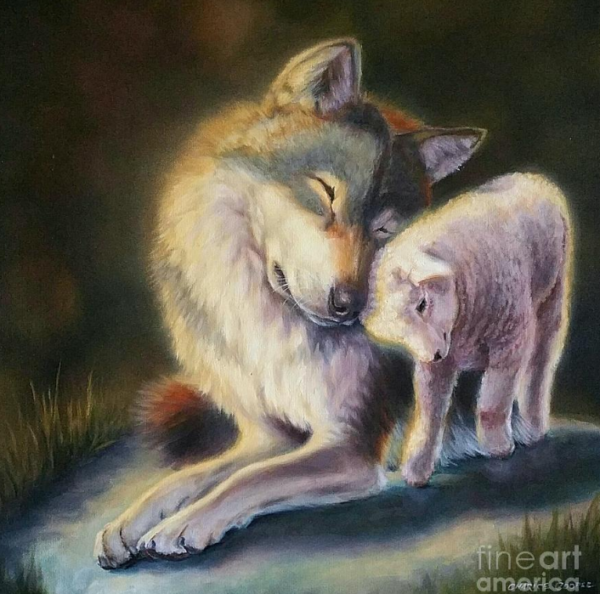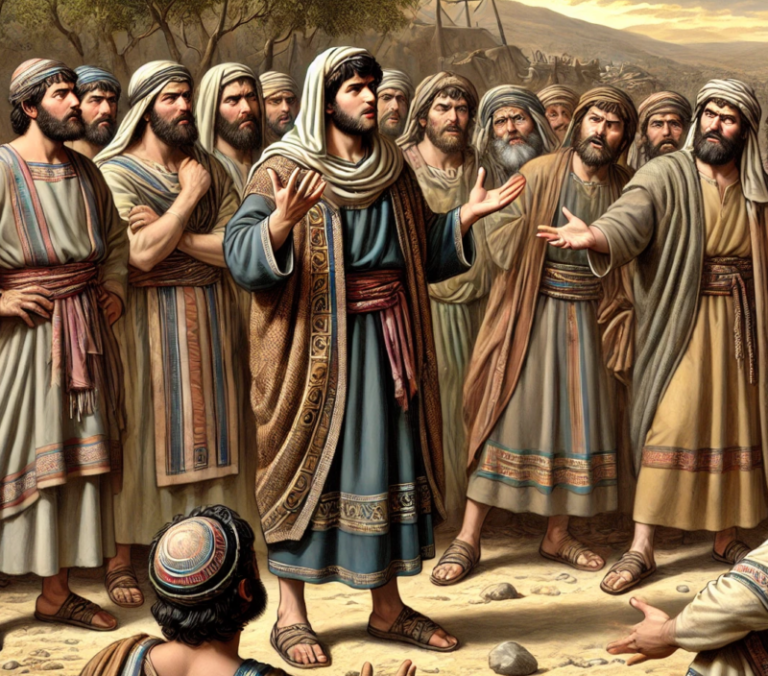Do You Really Want World Peace?

In the final words of Sefer Zecharyah, prophesying about a time in the future when the Holy Temple will be rebuilt in its place in the holy city of Yerushalayim, we read something most peculiar (Zecharyah 14:21): וְלֹא־יִהְיֶה כְנַעֲנִי עוֹד בְּבֵית־יְיָ צְבָקוֹת בַּיּוֹם הַהוּא (And in that day, there will no longer be a Canaanite [kena’ani] in the House of Hashem of Hosts). Why did Zecharyah need to tell us this? After all, didn’t the Canaanites cease to exist long ago? Yes they did, so what is Zecharyah talking about?
One of the most significant hallmarks of the Messianic Age is that all forms of idolatry [עבודה זרה, avodah zarah] will be nullified and eliminated. And what is the most widespread and significant form of avodah zarah in the world today? It is as explained in Likutei Moharan 13:1: וְזֶה בְּחִינַת הִתְגַּלּוּת מָשִׁיחַ שֶׁאֲזַי יִתְבַּטֵּל חֶמְדַּת הַמָּמוֹן כְּמוֹ שֶׁכָּתוּב בַּיּוֹם הַהוּא יַשְׁלִיךְ הָאָדָם אֶת אֱלִילֵי כַסְפּוֹ וֶאֱלִילֵי זְהָבוֹ (And this is an aspect of the revelation of Mashiach, that then the desire for money will be eliminated, as it is written [Yeshaya 2:20], ‘In that day, man will cast off his idols of silver and his idols of gold’). Further, it is taught: (Likutei Eitzot, Mamon u’Farnasah 6): תַּאֲוַת מָמוֹן הוּא עֲבוֹדָה זָרָה מַמָּשׁ וְכָל זְמַן שֶׁיֵּשׁ עֲבוֹדָה זָרָה זֹאת שֶׁל מָמוֹן בָּעוֹלָם חֲרוֹן אַף בָּעוֹלָם (The craving for money is literally a form of avodah zarah, and as long as there is this avodah zarah of money in the world the wrath [of God] is in the world). As R' Nachman further teaches (L.M. 13:1): לְהַמְשִׁיךְ הַשְׁגָּחָה שְׁלֵמָה אִי אֶפְשָׁר אֶלָּא עַד שֶׁיְּשַׁבֵּר תַּאֲוַת מָמוֹן וּשְׁבִירָתָהּ הוּא עַל־יְדֵי צְדָקָה (It is impossible to draw down complete Divine Providence until one smashes the craving for money, and the breaking of this craving is achieved through the giving of charity [tzedekah]). And it is written (Yeshaya 11:9): כִּי־מָלְאָה הָאָרֶץ דֵּעָה אֶת־יְיָ כַּמַּיִם לַיָּם מְכַסִּים (For the land will be filled to know Hashem, like the water covers the sea). Therefore, we should understand that, in the future, since the world will experience Divine Providence like never before, the avodah zarah of money will be completely broken.
With that as background, we can approach the crux of the matter. Have you ever wondered what the business world will look like in the Messianic Age considering the fact that the desire for money will be eliminated? As one highly astute fellow said recently, “The purpose of all business can be boiled down to one thing: to design and execute the most efficient mechanism to move money from someone else’s pocket into our pocket.” So if the desire for money will be cancelled out at that time, what will happen to business? To answer that, we need to understand what underlies all business.
A second hallmark of the Messianic Age is world peace, as it is written (Yeshaya 11:6-7): וְגָר זְאֵב עִם־כֶּבֶשׂ וְנָמֵר עִם־גְּדִי יִרְבָּץ…וְאַרְיֵה כַּבָּקָר יֹאכַל־תֶּבֶן (And the wolf will live with the sheep, and the leopard will lie down with the young goat…and the lion will eat straw like the ox). But how is world peace going to be achieved? The answer is that it has to be built up from within ourselves, as it is taught (L.M. 14:8): וְיֵשׁ שְׁנֵי מִינֵי שָׁלוֹם: יֵשׁ שָׁלוֹם בַּעֲצָמָיו כִּי תְּחִלָּה צָרִיךְ אָדָם לִרְאוֹת שֶׁיִּהְיֶה שָׁלוֹם בַּעֲצָמָיו כִּי לִפְעָמִים אֵין שָׁלוֹם כְּמוֹ שֶׁכָּתוּב אֵין שָׁלוֹם בַּעֲצָמַי מִפְּנֵי חַטָּאתִי (There are two kinds of peace. There is a peace ‘in one’s bones’, for initially, a person needs to comprehend that he can have ‘inner peace’ because sometimes there isn’t peace, as it is written [Tehillim 38:4]: ‘There is no peace in my bones, i.e. no inner peace, because of my sin’). Further, R' Nachman explains (L.M. 14:8): כְּשֶׁיֵּשׁ שָׁלוֹם בַּעֲצָמָיו אָז יָכוֹל לְהִתְפַּלֵּל…וְעַל־יְדֵי תְּפִלָּה זוֹכֶה לַשָּׁלוֹם הַכְּלָלִי הַיְנוּ שְׁלֵמוּת הָעוֹלָמוֹת (When there is ‘inner peace’ then one is able to pray…and through prayer, one merits to achieve general peace, i.e. the perfection/wholeness of the worlds). And how do we learn to eliminate sin so we can achieve ‘inner peace’? It is written (Mishlei 3:7): אַל־תְּהִי חָכָם בְּעֵינֶיךָ יְרָא אֶת־יְיָ וְסוּר מֵרָע (Do not be wise in your own eyes; fear Hashem and turn away from evil). Without the fear of G-d, we can’t forsake sin, and if we can’t forsake sin, then we can’t achieve wholeness, i.e. peace. So clearly, world peace can’t be imposed upon us, it must be built up initially from within each one of us.
Now we can understand what underpins all forms of business, and it has to do with the secret behind the meaning of kena’ani mentioned at the beginning of this article. We find the secret revealed early on in the Torah, as taught (L.M. 277): וְזֶה בְּחִינוֹת וַיְהִי רִיב בֵּין רוֹעֵי מִקְנֵה אַבְרָם וּבֵין רוֹעֵי מִקְנֵה לוֹט וְהַכְּנַעֲנִי אָז בָּאָרֶץ שֶׁעַל־יְדֵי הָרִיב וְהַמַּחֲלֹקֶת עַל־יְדֵי־זֶה וְהַכְּנַעֲנִיּ (And this is indicated by the following verse [Bereshit 13:7]: ‘And there was strife/contention between the herdsmen of Avram and the herdsmen of Lot, and the Canaanite [kena’ani] was then in the land’, that through strife and dispute, through that, the kena’ani [was in the land]). And who is the kena’ani? He is the businessman, the merchant, the trader, as taught throughout our Holy Scriptures in many places and as explained by our Sages (e.g. Hoshea 12:8 and Pesachim 50a). One well known example that we all know about comes from the song אשת חיל [Eishet Chayil, the Woman of Valor/Strength] which we sing every Shabbat evening, where it is written (Mishlei 31:24): סָדִין עָשְׂתָה וַתִּמְכֹּר וַחֲגוֹר נָתְנָה לַכְּנַעֲנִי (She makes cloth and sells it, and gives a belt to a kena’ani). There, Rashi specifically says that kena’ani means תגר [tagar, a merchant].
The teaching of R' Nachman in Likutei Moharan 14:12 may now be understood much more easily: וְעַל־יְדֵי הַשָּׁלוֹם זוֹכִין לִתְפִלָּה וְעַל־יְדֵי זֶה זוֹכִין לַשָּׁלוֹם הַכְּלָלִי שָׁלוֹם בְּכָל הָעוֹלָמוֹת. וַאֲזַי כְּשֶׁזּוֹכִין לַשָּׁלוֹם הַכְּלָלִי אֲזַי יִתְבַּטֵּל כָּל הַמַּשָּׂא וּמַתָּן מִן הָעוֹלָם כִּי כָּל הַמַּשָּׂא וּמַתָּן שֶׁבָּעוֹלָם הוּא מֵהֶעְדֵּר הַשָּׁלוֹם כִּי אִי אֶפְשָׁר שֶׁיִּהְיֶה רְצוֹן הַמּוֹכֵר וְהַקּוֹנֶה שָׁוֶה כִּי זֶה רוֹצֶה לִמְכֹּר וְזֶה רוֹצֶה לִקְנוֹת וְאִם הָיָה רְצוֹנָם שָׁוֶה לֹא הָיָה אֶפְשָׁר שֶׁיִּהְיֶה נַעֲשֶׂה שׁוּם מַשָּׂא וּמַתָּן (Through peace we merit prayer, and through prayer we merit general peace, peace throughout all of the worlds. And then, when we merit general peace, then all business will be eliminated from the world because all business in the world stems from a lack of peace, because it is impossible for the will of the seller and the buyer to be the same, because this one wants to sell and this one wants to buy, and if their wills were the same, it would not be possible to transact any business). In other words, in this world today, the seller wants to extract the most amount of money possible from the buyer, while the buyer wants to hand over the least amount of money as possible. And the very nature of this transaction, of this “give and take” or bargaining (or whatever we want to call it) is a lack of peace. The people involved may even say that they enjoy this ‘give and take’ process, but that doesn’t mean that there is peace among them. It just means that they both enjoy strife, contention and dispute.
This is why it is further taught there (L.M. 14:12): נִמְצָא שֶׁכָּל הַמַּשָּׂא וּמַתָּן וְהַסְּחוֹרוֹת הוּא רַק עַל־יְדֵי בְּחִינַת מַחֲלֹקוֹת שֶׁאֵין שָׁלוֹם בֵּין הָרְצוֹנוֹת. וְזֶה בְּחִינַת: וַיְהִי רִיב בֵּין רֹעֵי מִקְנֵה אַבְרָם וּבֵין רֹעֵי מִקְנֵה לוֹט וְהַכְּנַעֲנִי אָז בָּאָרֶץ. כְּנַעֲנִי בְּחִינַת סוֹחֵר (We find that all business and trade comes about only from dispute, that there isn’t any peace between the wills [of the buyer and seller]. And this is an aspect of [Bereshit 13:7]: ‘And there was strife/contention between the herdsmen of Avram and the herdsmen of Lot, and the Canaanite [kena’ani] was then in the land.’ The word kena’ani alludes to a merchant/trader). In other words, when people strive and contend with each other, merchants, traders and business activities exist in the world.
And so R' Nachman concludes this section of his teaching with words that take us back to the beginning of this article (L.M. 14:12): אֲבָל לֶעָתִיד לָבוֹא שֶׁיִּהְיֶה הַשָּׁלוֹם הַמֻּפְלָא בָּעוֹלָם כְּמוֹ שֶׁכָּתוּב: וְגָר זְאֵב עִם כֶּבֶשׂ וְנָמֵר עִם גְּדִי. אֲזַי יִתְבַּטֵּל הַמַּשָּׂא וּמַתָּן כְּמוֹ שֶׁכָּתוּב: וְלֹא יִהְיֶה כְּנַעֲנִי עוֹד (But in the future, there will be wondrous peace in the world, as it is written [Yeshaya 11:6]: ‘And the wolf will live with the sheep, and the leopard [will lie down] with the young goat.’ Then business activity will be cancelled out, as it is written [Zecharyah 14:21]: ‘and there will no longer be a kena’ani’). And just in case you’re wondering, this explanation of the word kena’ani in Zecharyah 14:21 agrees with most of the commentators who likewise point out that kena’ani doesn’t refer to the Canaanites, but rather to merchants (see Targum Yonatan, Rashi, Ibn Ezra, Abarbanel and Malbim).
We can now reveal the deeper meaning of a well known verse describing how the future redemption takes place (Yeshayah 55:12): כִּי־בְשִׂמְחָה תֵצֵאוּ וּבְשָׁלוֹם תּוּבָלוּן (For you shall leave in simchah, and in peace you will be brought). There are two steps to complete redemption. The first stage, which is leaving exile/captivity itself, happens only when we are able to express happiness in all situations because we know and feel that Hashem loves us and that everything He does is for our ultimate good. The second stage is what happens after the initial exodus, and that is the journey to and arrival at the ultimate destination. And this stage happens only when we are able to conduct ourselves with each other in peace as explained in this article. We see this from what is written regarding the initial redemption, i.e. from Egypt (Shemot 19:2): וַיִּסְעוּ מֵרְפִידִים וַיָּבֹאוּ מִדְבַּר סִינַי וַיַּחֲנוּ בַּמִּדְבָּר וַיִּחַן־שָׁם יִשְׂרָאֵל נֶגֶד הָהָר (And they travelled from Rephidim and came to the Desert of Sinai, and they camped [vayachanu] in the desert, and Yisrael camped [vayichan] there opposite the mountain). Rashi famously explains when pointing out the use of vayachanu [and they camped] versus vayichan [and it camped], the nation being described simultaneously as a collection of individuals and as a single entity: כְּאִישׁ אֶחָד בְּלֵב אֶחָד (as one man with one heart). This is the meaning of וּבְשָׁלוֹם תּוּבָלוּן (and in peace you will be brought) that is described in Yeshaya 55:12. Let’s be clear, we cannot be brought to the ultimate goal of the final redemption if we view each other as potential income sources.
So now that we know what the business world will look like after the revelation of Mashiach, do we still want Mashiach to come right away, or would we prefer that he wait just a little bit longer before he reveals himself? We may as well be honest with ourselves. That’s a good place to start. In the meantime, if we want to start thinking about what we really ought to be doing, we just need to ask ourselves one question. What would I do with my life if there was no money and there was no way to make profit from others? It’s either a world of peace or a world of business. We can’t have it both ways.






